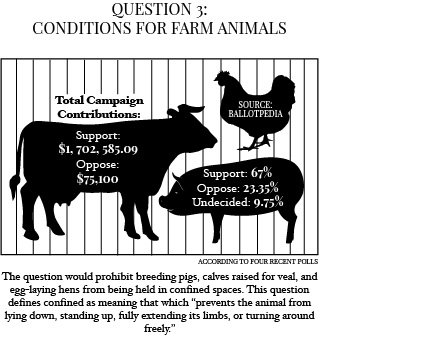
Massachusetts Ballot Question 3, if passed, would prohibit the sale of pork, veal and eggs produced from animals held in confined spaces, according to petition filed with Attorney General Maura Healey’s office.
The initiative aims to stop the forceful confinement of animals, which prevents them “from lying down, standing up, fully extending the animal’s limbs, or turning around freely,” on the grounds that this constitutes animal cruelty, according to the initiative petition.
The law does include exceptions allowing animals to be confined in cases such as transportation, exhibitions, medical research and treatment under the direct supervision of a licensed veterinarian, according to the petition.
Citizens for Farm Animal Protection is the coalition campaigning in favor of Question 3. Campaign Director Stephanie Harris said confining farm animals is not only cruel, but that it also carries health risks for people.
“The science is clear,” Harris said. “Locking animals in cages causes them to suffer, and it increases the risk of problems like Salmonella and E.coli.”
Kimberly Barzola, a community organizer for Citizens for Farm Animal Protection, elaborated on the link between confinement and salmonella in an email.
“Studies have shown the chickens kept in battery cages have an increase[d] chance of Salmonella due to the wiring of the cage and the number of chickens kept in such a small area with no room to move around,” Barzola, a senior in Boston University’s College of Arts and Sciences, wrote.
Citizens Against Food Tax Injustice, the group leading the opposition to Question 3, considers the question to be a misleading “social injustice” that will create a $215 million food tax, according to Campaign Manager Diane Sullivan.
“The question itself was written purposely to mislead voters,” Sullivan said. “It will essentially ask us, ‘Do you want to prevent cruelty to animals?’ and there’s no mention of the economic impact in the question itself.”
Harris explained that although Question 3 raises economic issues, voters should weigh this against the risks Massachusetts would face if the initiative were not approved.
“While it’s possible that giving these animals better living conditions may increase the price of eggs by a few pennies per dozen, the hidden cost of such inhumane confinement is increased cruelty and food safety risks,” Harris said. “It’s the animals and consumers who are currently paying those hidden prices.”
On the other hand, Sullivan said she challenges the estimate that the increase in egg prices would be limited to merely pennies on the dozen.
“We can already go into a local grocery store and see the cost difference between a dozen conventional eggs and a dozen cage-free eggs — the cage-free eggs are anywhere between two and four times more expensive,” Sullivan said.























































































































Seth Lustig • Nov 3, 2016 at 12:58 pm
There is nothing in the measure that requires them to be grown and kept out of cages, or free-range, ever.
The measure says they have to be in less cruel cages, and goes on to describe the minimum requirements of those cages.
Chicken hens, for example, will be allowed to be kept, their entire lives in the same 1.5 square feet of floor space, plus room to flap their wings.